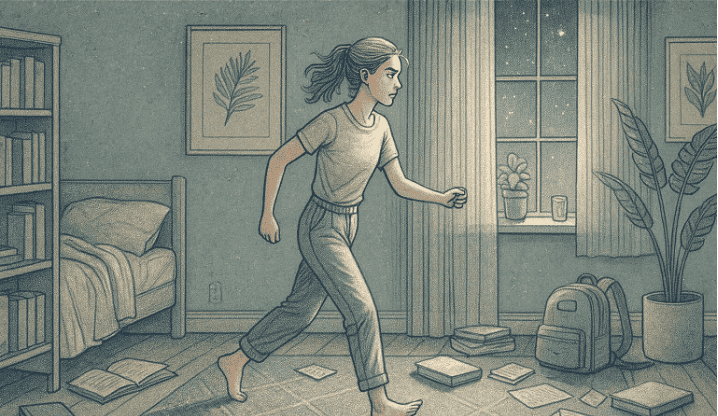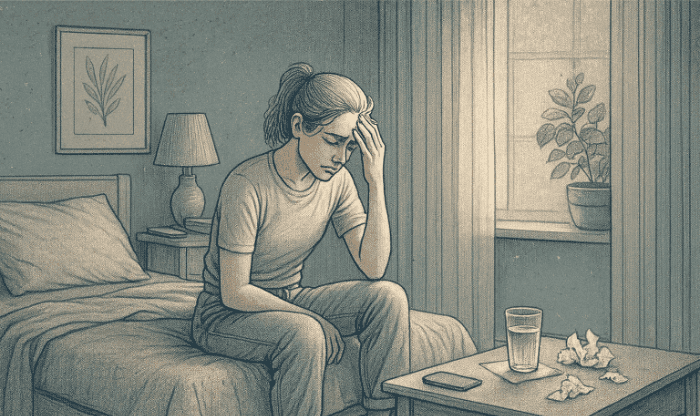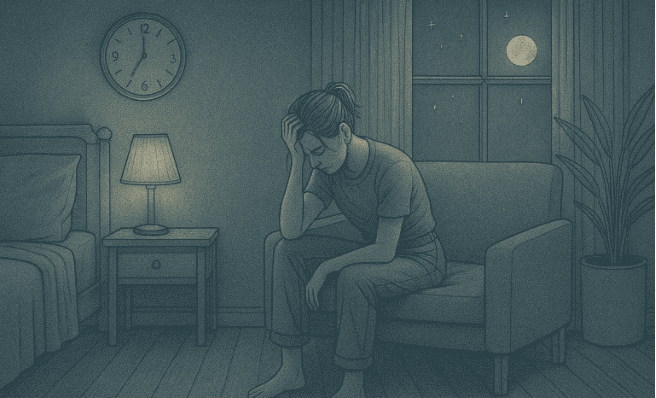Key Takeaways
- Teen insomnia doesn’t always look like sleepless nights; it often shows up as aggression, irritability, or hyperactivity caused by the brain struggling to regulate emotions and energy on too little rest.
- Academic struggles and concentration issues are common red flags, since poor sleep disrupts memory, focus, and problem-solving skills, making schoolwork much harder.
- Insomnia often brings unexplained physical symptoms, like headaches, stomach problems, or frequent illnesses, as sleep deprivation weakens the immune system and strains the body.
- Extreme mood swings and emotional instability can signal chronic sleep loss, creating a cycle of exhaustion and stress that impacts family life, friendships, and overall well-being.
- Mission Prep’s therapeutic programs address sleep disorders through behavioral therapy, family support, and comprehensive treatment approaches
Understanding Insomnia in Teenagers
When parents picture insomnia, they often imagine someone wide awake in bed, staring at the ceiling. For teens, it usually looks very different. Instead of dragging through the day, they might seem restless, irritable, or emotionally on edge.
During puberty, natural sleep rhythms shift, making late nights and sleeping in more appealing. But insomnia isn’t just about staying up late. It’s a pattern of trouble falling asleep, staying asleep, or getting the kind of rest that fuels the mind and body.
The teenage brain is still wiring itself, especially in areas tied to emotions, decision-making, and self-control. Without solid sleep, these systems take a bigger hit, showing up as behaviors that don’t immediately look sleep-related. Recognizing these signs early gives parents a chance to step in before sleep struggles spill into mental health, school, and family life.
Mission Prep Healthcare specializes in mental health treatment for teens aged 12-17, offering residential and outpatient programs for anxiety, depression, trauma, and mood disorders. Our therapies include CBT, DBT, EMDR, and TMS, tailored to each adolescent’s needs.
With a structured, supportive environment, we integrate academic support and family involvement to promote lasting recovery. Our goal is to help teens build resilience and regain confidence in their future.
5 Signs of Insomnia in Teens
Sign 1: Increased Aggression and Irritability
One of the most noticeable signs of teen insomnia is a dramatic increase in aggressive behavior or irritability that seems disproportionate to the situation. Your typically reasonable teen might explode over minor requests, snap at siblings for small annoyances, or respond to gentle questions with surprising hostility.
This aggression often catches families off guard because it represents a significant change from the teen’s usual personality. Parents might find themselves walking on eggshells, unsure what will trigger an outburst, or feeling like they’re dealing with a completely different person.
The aggression stems from sleep deprivation’s impact on the prefrontal cortex, the brain region responsible for emotional regulation and impulse control. When this area isn’t functioning optimally due to lack of sleep, teens struggle to manage normal frustrations and respond proportionately to everyday stressors.
You might notice your teen becoming defensive about routine topics, overreacting to constructive feedback, or showing road rage-like responses to minor inconveniences. These behaviors often improve dramatically once healthy sleep patterns are restored, indicating that the underlying issue is sleep-related rather than a fundamental personality change.
Sign 2: Hyperactivity and Restlessness

Teens with insomnia may appear restless and hyperactive as their bodies fight against exhaustion with stress hormones.
Contrary to what many expect, sleep-deprived teens often appear hyperactive rather than sluggish. They might seem unable to sit still, constantly fidget, talk rapidly, or appear “wired” even when exhausted.
This hyperactivity represents the body’s attempt to stay alert when it should be resting. The brain releases stress hormones like cortisol and adrenaline to fight fatigue, creating a state of artificial energy that looks like hyperactivity but actually signals severe overtiredness.
Your teen might pace around the house, have difficulty sitting through family meals, or seem constantly in motion even during quiet activities like watching television. They might talk faster than usual, jump between topics quickly, or seem unable to focus on calm, sedentary activities.
This restlessness often becomes more pronounced in the evening hours when the body should naturally be winding down for sleep. Instead of feeling sleepy, teens might feel increasingly energized and agitated, making it even harder to fall asleep and perpetuating the cycle.
Parents sometimes mistake this hyperactivity for typical teenage energy or assume their teen doesn’t need as much sleep. However, this behavior pattern often indicates that the nervous system is overstimulated from chronic sleep deprivation.
Sign 3: Academic Struggles and Concentration Issues
Sleep plays a crucial role in memory consolidation, attention, and cognitive processing. Teens with insomnia often show sudden declines in academic performance, difficulty concentrating during classes, or problems completing assignments that previously felt manageable.
You might notice your teen taking much longer to complete homework, frequently losing focus during conversations, or struggling to remember information they learned recently. Teachers might report that your teen seems distracted, has difficulty following multi-step instructions, or appears to “zone out” during lessons.
These concentration issues extend beyond schoolwork. Teens might forget important family conversations, lose track of household responsibilities, or seem unable to follow through on commitments they made just hours earlier.
The cognitive impact of poor sleep can be particularly frustrating for high-achieving students who notice a significant gap between their usual abilities and current performance. This awareness sometimes creates additional anxiety that further interferes with sleep quality.
Many families initially attribute academic struggles to laziness, lack of motivation, or too much screen time without recognizing the underlying sleep disorder. When concentration problems persist despite removing distractions or increasing study time, insomnia should be considered as a potential cause.
Sign 4: Physical Symptoms and Health Complaints

Physical symptoms like headaches, stomach issues, and frequent minor illnesses often accompany teen sleep disorders.
Teen insomnia frequently presents through physical symptoms that might not seem obviously related to sleep problems. These can include frequent headaches, stomach issues, muscle tension, or a weakened immune system, leading to recurring minor illnesses.
Your teen might complain of feeling “off” physically without being able to identify specific symptoms. They might mention feeling dizzy, experiencing chest tightness, or having unexplained aches and pains that move around their body.
Appetite changes are also common, with some teens losing interest in food while others develop cravings for high-sugar or high-caffeine foods as their bodies seek quick energy sources. These eating pattern changes can create additional health concerns and mood instability.
Sleep deprivation weakens the immune system function, making teens more susceptible to colds, infections, or other minor health issues. If your teen seems to catch every bug going around school or takes longer than usual to recover from minor illnesses, poor sleep quality might be contributing to their compromised immunity.
These physical symptoms sometimes lead to multiple doctor visits or extensive medical testing before families consider sleep as the underlying cause. While it’s important to rule out other health issues, persistent unexplained physical symptoms in teenagers often improve significantly when sleep quality is addressed.
Sign 5: Extreme Mood Swings and Emotional Instability
One of the toughest parts of teen insomnia is the emotional rollercoaster it creates. A well-rested morning can quickly unravel into irritability, sadness, or anger as the day goes on and exhaustion builds.
These shifts often feel unpredictable. A simple decision might feel overwhelming, small setbacks can spark big reactions, and moments that should feel fun may leave your teen flat or disconnected. Parents may feel like they’re walking on eggshells, unsure how their teen will react from one moment to the next.
This emotional turbulence doesn’t just affect the family; it weighs on teens too. Many feel frustrated or confused by their inability to manage their emotions, which only adds to the stress of already running on empty.
When to Seek Professional Help for Teen Insomnia
While occasional sleep difficulties are normal during adolescence, persistent insomnia requires professional attention. If your teen shows multiple signs of sleep deprivation for more than a few weeks, or if sleep problems significantly impact daily functioning, it’s time to seek help.
Red flags include dramatic personality changes, declining academic performance despite support, increasing social isolation, or physical symptoms that don’t respond to medical treatment. Early intervention is crucial because teenage sleep patterns, once disrupted, can be challenging to restore without appropriate support.
Why Mission Prep Addresses Sleep and Mental Health Together

Mission Prep’s comprehensive approach recognizes that sleep disorders and mental health challenges often interconnect and require integrated treatment.
When teen insomnia persists despite family efforts, Mission Prep Healthcare provides specialized programs that address both sleep disorders and related mental health challenges through comprehensive therapeutic approaches.
Our programs serve adolescents ages 12 to 17 through residential, outpatient, and telehealth services that understand the complex relationship between sleep, emotional regulation, and overall mental health. We combine evidence-based sleep therapies like cognitive-behavioral therapy for insomnia with broader mental health treatment.
Our family-focused approach ensures parents understand how to support their teen’s recovery and create home environments that promote healthy sleep. We provide education about adolescent sleep needs and strategies for reducing family stress that may interfere with rest.
Frequently Asked Questions (FAQ)
How can I tell if my teen’s sleep problems are serious enough to need professional help?
Look for persistent patterns lasting more than two to three weeks that significantly impact daily functioning. If sleep problems are affecting academics, family relationships, or your teen’s emotional well-being, professional evaluation is recommended even if the issues seem manageable.
Can therapy really help with teen insomnia, or do they need sleep medication?
Therapeutic approaches like cognitive-behavioral therapy for insomnia are highly effective for teens and often provide longer-lasting results than medication alone. These therapies address the underlying thoughts, behaviors, and anxieties that contribute to sleep problems while teaching practical skills for better sleep.
Why does my teen seem hyperactive when they’re not getting enough sleep?
Sleep deprivation triggers the release of stress hormones like cortisol and adrenaline as the body fights fatigue. This creates artificial energy that appears like hyperactivity but actually indicates severe overtiredness. This “wired but tired” state is common in sleep-deprived teenagers.
What programs does Mission Prep offer for teens with sleep disorders?
Mission Prep provides residential, outpatient, and telehealth programs specifically designed for adolescents ages 12-17 dealing with insomnia and related challenges. Our approach includes individual therapy, family therapy, and evidence-based treatments like cognitive-behavioral therapy for insomnia, all integrated with comprehensive mental health support that addresses the whole person.















